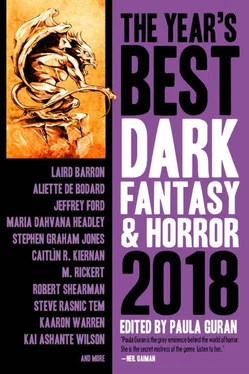It is true that, as they said, the skin was mine. So much was made of this! We had a fight. About what, I can’t remember. There was dirt on my dress and shoes and socks. We ran through backyards and fields to get to our tree. Dirt is not blood, or criminal in any way, but try telling that to folks set on vengeance, or any of the Strangos who think they know so much.
When October comes I decorate with photographs of the dead: Laurel and me as already mentioned, my parents, and my bother whose suicide is not a part of this story. Also my cats, Batman and Robin, each found with strings around their necks and, I believe, victims of my notoriety. I arrange the photographs in a display of fake autumn leaves ever since trying to use real ones which brought bugs into the house, an infestation I do not want to repeat, appropriate as it may be to the occasion.
Sadly, no one begs treats from me; a pattern I ignored for years, stocking up on candy bars, popcorn balls, and fairly expensive caramel apples which I ate throughout winter, solidifying the caramel flavor of loneliness, the apple bite of regret. While others dress as someone else, I dress as myself (or the girl I once was) in yellow gingham, white socks, black shoes, headband; waiting until dark before I sneak through the backyards, everyone so distracted I make an easy passage to the tree where I wait. The first time I did this I panicked when I realized how, without awareness, I had so thoroughly become Laurels last moments, or what we know of them, before she was murdered, but no one came to reenact the crime. I just sat shivering, in the dark.
We had gone trick or treating with strict instructions to return home by ten but, if you haven’t picked up on this by now, Laurel was cheeky and I, her happy co-conspirator.
“Heyo,” she said, (using our twin language) “Let’s go-o to our-o tree-o.”
Why? Oh, I don’t remember though I suspect it seemed just enough of a transgression to deliver a delicious thrill, running through moonlight on that night inhabited by the occult. It was meant to be fun! We giggled and whispered, lugging pillowcases heavy with loot.
The paper reported candy wrappers littered amongst the leaves. I suppose this is right. We probably delighted in our feast, drunk on sugar. We fought. About what, I don’t remember. She scratched me and I ran home, though to this day I can hear her cries. “Come-o back-o,” she called. “Im-o afraid-o of the Strangos.” A false laugh, and then, “Don’t go-o-o.”
Later, the policeman handed me a cider doughnut and said, “I often think what I would say if I had one more day with my friend who died. Heck, I bet you know what that’s like, don’t you?”
Click-click.
“Go ahead. Close your eyes. Picture Laurel.”
Click.
“Say it.”
“Forgive me.”
“Who but the guilty ask forgiveness?” The prosecutor intoned over and over again. In my youth I thought this was compelling, but as a grownup I am shocked that adults fell for this false equivalency. Though I was guilty to be sure, it was not of the crime I was charged with. In the end, I was just a bad friend. No danger of repeating that mortal error again. Who would want to be friends with me? I can tell you the answer is no one. Not even a ghost.
Yet, I persist. In spite of the solemnity of the season I have come to enjoy my celebration which begins, as I have said, with the altar of dead and so forth until the great night arrives when I turn off all my lights and—dressed as myself all those years ago—sneak away from streets teeming with Strangos of all shapes and sizes; generations of Strangos with no connection to Laurel or her life to stand beneath our tree where I beg her to forgive me, jump when a leaf falls (briefly seeing too much meaning in it) and look at my hands. So large, though once they were so small. I shiver in the cold. Walk home alone, shoes and socks dampened by frost.
The next morning I pack photographs, dress, headband, purse and the rest. I toss out the caramel apple sticks and pumpkin tea wrappers. I stand at the closed window noting how the tree limbs scratch the gray sky, the fallen leaves decomposed of color. November is the worst month, that brutal time after they found her body and my own mother began the wandering which defined her final years. She paced at all hours; locking doors, sprinkling sugar on the floor (“It will mark his footprints,” she said) and cut up tablecloths which she insisted made perfect fabric for new dresses, though I never saw any sewn. Perhaps I outgrew them in that time between the charge and my acquittal. My father found solace in fantasies of revenge, which he described in our new ritual of bedtime stories. “First, I’ll tear off his fingernails,” he said and so forth, seeding my sleep with nightmares from which I often woke to find my brother weeping in a dark corner.
I was arrested in December so it would not be unreasonable to assume the month ruined for me but I have recovered the season; enlivened by the tradition of Christmas ghosts. Laurel loved the holiday; it made sense she would use the occasion to make a grand entrance. In spite of what that movie inferred she never would have become zombified with an appetite for blood; even dead she would remain a life force. I know she wasn’t always sweet, or even good but she could make me laugh when no one else did. She told Petal Mearlot and Tina Schubert to stop throwing stones at me, and the day after Christmas—that last year—she pretended to be impressed by my meager haul then brought me to her house (it smelled of peppermint and evergreen) where she dumped the contents of a giant stocking on her bed, dividing it between us because, she said, Santa meant for me to have an equal share. “Were just so alike. Sometimes he gets us confused.”
So it came to be that I made the error of inviting the Strangos I found standing beneath the streetlamp into my house. They looked cold and forlorn and, I admit, I was curious. Why would they choose to be Strangos when they could be daughters; loved and loving on early Christmas morn?
“Why are you here?” I asked, as I hung their wet coats in the downstairs shower where they dropped chips of ice on the linoleum.
“We came to see Laurel’s tree. Did you cut it down?” they asked. “Did you save the wood? ’Cause it’s haunted.”
“Here.” I offered the blue willow cup and saucer my mother once loved, trembling with excitement at my first Christmas guests, ever. “Do you take lemon, cream, or sugar?”
“Oh, I don’t drink tea,” said the first Strango, frowning into the cup.
“Me neither,” said the other. “What else you got?”
They reminded me of Laurel. She would have sounded bossy, just like them. It put a smile on my face, it really did.
“I have Coke and milk. There might be juice.”
“What about eggnog?”
I shook my head, no. “My mother said it is dangerous because of the eggs.”
“There are no eggs in eggnog,” said Strango One, frowning into her cup.
“What about cocoa?” asked Strango Two. “But it must have whipped cream. I hate marshmallows.”
“Laurel hates marshmallows too,” I blurted.
“We know,” the Strangos said in unison.
An uncomfortable silence settled over us. I wondered how they knew this about her. Was it buried somewhere in the movie; in the early scene when we met in kindergarten, perhaps? Or maybe noted in the companion volume, which I never purchased though I did page through it once, in the library, hunkered between shelves like a voyeur, my worn copy of Rilke temporarily abandoned?
“What’s it like?” Strango One asked. “To live in her house?”
“Whose house?”
“The murderer.”
I knew how Christmas was supposed to be and, while I had never entertained visitors, I had an idea how they were supposed to behave. I decided to rise above my guest’s poor manners. “Would you like toast? I can cut it in the shape of a star, or a boot.
Читать дальше












